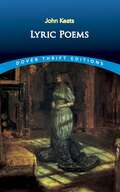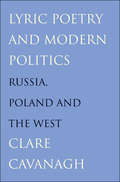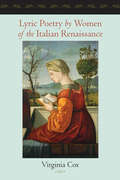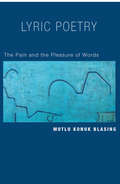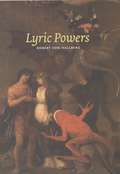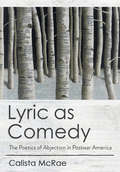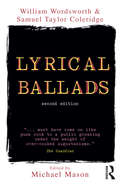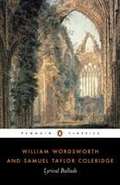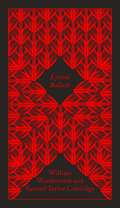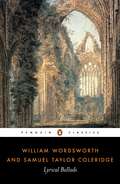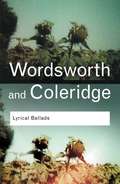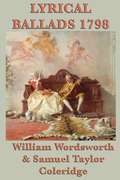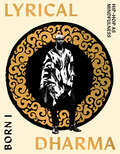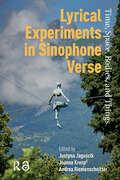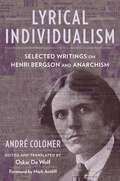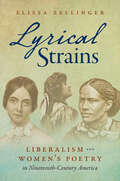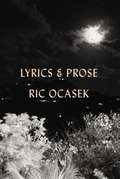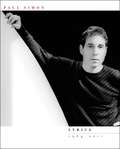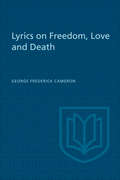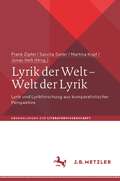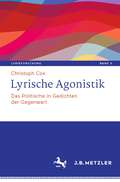- Table View
- List View
Lyric Poems (Dover Thrift Editions: Poetry Ser.)
by John KeatsOne of the greatest English poets, John Keats (1795-1821) created an astonishing body of work before his early death from tuberculosis at the age of 26. Much of his poetry consists of deeply felt lyrical meditations on a variety of themes--love, death, the transience of joy, the impermanence of youth and beauty, the immortality of art, and other topics--expressed in verse of exquisite delicacy, originality, and sensuous richness. This collection contains 30 of his finest poems, including such favorites as "On first looking into Chapman's Homer," "The Eve of St. Agnes," "On seeing the Elgin Marbles," "La Belle Dame sans Merci," "Isabella; or, the pot of Basil" and the celebrated Odes: "To a Nightingale," "On a Grecian Urn," "On Melancholy," "On Indolence," "To Psyche," and "To Autumn." These and many other poems, reproduced here from a standard edition, represent a treasury of time-honored poetry that ranks among the glories of English verse.
Lyric Poetry and Modern Politics
by Clare CavanaghLyric Poetry and Modern Politics explores the intersection of poetry, national life, and national identity in Poland and Russia, from 1917 to the present. As a corrective to recent trends in criticism, acclaimed translator and critic Clare Cavanagh demonstrates how the practice of the personal lyric in totalitarian states such as Russia and Poland did not represent an escapist tendency; rather it reverberated as a bold political statement and at times a dangerous act. Cavanagh also provides a comparative study of modern poetry from the perspective of the eastern and western sides of the Iron Curtain. Among the poets discussed are Blok, Mayakovsky, Akhmatova, Yeats, Whitman, Frost, Szymborska, Zagajewski, and Milosz; close readings of individual poems are included, some translated for the first time. Cavanagh examines these poets and their work as a challenge to Western postmodernist theories, thus offering new perspectives on twentieth-century lyric poetry.
Lyric Poetry by Women of the Italian Renaissance
by Virginia CoxBilingual, annotated edition of more than 200 poems by Italian Renaissance women, many of which have never before been published in English.Outstanding Academic Title, ChoiceLyric Poetry by Women of the Italian Renaissance is the first modern anthology of verse by Italian women of this period to give a full representation of the richness and diversity of their output. Although familiar authors such as Vittoria Colonna, Gaspara Stampa, and Veronica Gambara are well represented, half of the fifty-four poets featured are unknown even to many specialists. Especially noteworthy is an extensive selection of verse from the period following 1560, which has received little or no critical attention. This later, strikingly experimental, proto-Baroque tradition of verse is reconstructed here for the first time.Virginia Cox creates both a scholarly teaching resource and a collection of poetry accessible to general readers with no previous knowledge of the Italian poetic tradition. Each poem is presented in its original language, accompanied by a translation and commentary. An introduction traces the history of Italian lyric poetry from the fifteenth to the seventeenth century. Cox also provides a guide to meter, rhythm, and rhyme, as well as a glossary of rhetorical terms and a biographical dictionary of authors.Organized thematically, this book offers poems about love, religion, and politics; verse addressed to patrons, friends, family, and places; and polemical and correspondence verse. Four languages are represented: Greek, Latin, literary Tuscan of various levels of standardization, and the stylized rustic dialect of pavan. The volume contains more than 200 poems, of which about a quarter have never before been published in a modern edition and more than a third have not previously been available in English translation."Exhaustive and insightful... This is an amazing book, a major achievement in the field of women's studies."—Renaissance Quarterly, reviewing Women’s Writing in Italy, 1400–1650
Lyric Poetry: The Pain and the Pleasure of Words
by Mutlu BlasingLyric poetry has long been regarded as the intensely private, emotional expression of individuals, powerful precisely because it draws readers into personal worlds. But who, exactly, is the "I" in a lyric poem, and how is it created? In Lyric Poetry, Mutlu Blasing argues that the individual in a lyric is only a virtual entity and that lyric poetry takes its power from the public, emotional power of language itself. In the first major new theory of the lyric to be put forward in decades, Blasing proposes that lyric poetry is a public discourse deeply rooted in the mother tongue. She looks to poetic, linguistic, and psychoanalytic theory to help unravel the intricate historical processes that generate speaking subjects, and concludes that lyric forms convey both personal and communal emotional histories in language. Focusing on the work of such diverse twentieth-century American poets as T. S. Eliot, Ezra Pound, Wallace Stevens, and Anne Sexton, Blasing demonstrates the ways that the lyric "I" speaks, from first to last, as a creation of poetic language.
Lyric Powers
by Robert Von HallbergThe authority of poetry varies from one period to another, from one culture to another. For Robert von Hallberg, the authority of lyric poetry has three sources: religious affirmation, the social institutions of those who speak the idioms from which particular poems are made, and the extraordinary cognition generated by the formal and musical resources of poems. Lyric Powers helps students, poets, and general readers to recognize the pleasures and understand the ambitions of lyric poetry. To explain why a reader might prefer one kind of poem to another, von Hallberg analyzes--beyond the political and intellectual significance of poems--the musicality of both lyric poetry and popular song, including that of Tin Pan Alley and doo-wop. He shows that poets have distinctive intellectual resources--not just rhetorical resources--for examining their subjects, and that the power of poetic language to generalize, not particularize, is what justly deserves a critic's attention. The first book in more than a decade from this respected critic, Lyric Powers will be celebrated as a genuine event by readers of poetry and literary criticism.
Lyric Powers
by Robert von HallbergThe authority of poetry varies from one period to another, from one culture to another. For Robert von Hallberg, the authority of lyric poetry has three sources: religious affirmation, the social institutions of those who speak the idioms from which particular poems are made, and the extraordinary cognition generated by the formal and musical resources of poems. Lyric Powers helps students, poets, and general readers to recognize the pleasures and understand the ambitions of lyric poetry. To explain why a reader might prefer one kind of poem to another, von Hallberg analyzes—beyond the political and intellectual significance of poems—the musicality of both lyric poetry and popular song, including that of Tin Pan Alley and doo-wop. He shows that poets have distinctive intellectual resources—not just rhetorical resources—for examining their subjects, and that the power of poetic language to generalize, not particularize, is what justly deserves a critic’s attention. The first book in more than a decade from this respected critic, Lyric Powers will be celebrated as a genuine event by readers of poetry and literary criticism.
Lyric Shame: The "Lyric" Subject of Contemporary American Poetry
by Gillian WhiteGillian White argues that the poetry wars among critics and practitioners are shaped by "lyric shame"--an unspoken but pervasive embarrassment over what poetry is, should be, and fails to be. "Lyric" is less a specific genre than a way to project subjectivity onto poems--an idealized poem that is nowhere and yet everywhere.
Lyric as Comedy: The Poetics of Abjection in Postwar America
by Calista McRaeA poet walks into a bar... In Lyric as Comedy, Calista McRae explores the unexpected comic opportunities within recent American poems about deeply personal, often embarrassing, experiences. Lyric poems, she finds, can be surprising sites of a shifting, unruly comedy, as seen in the work of John Berryman, Robert Lowell, A. R. Ammons, Terrance Hayes, Morgan Parker, Natalie Shapero, and Monica Youn. Lyric as Comedy draws out the ways in which key American poets have struggled with persistent expectations about what expressive poetry can and should do. McRae reveals how the modern lyric, rather than bestowing order on the poet's thoughts and emotions, can center on impropriety and confusion, formal breakage and linguistic unruliness, and self-observation and self-staging. The close readings in Lyric as Comedy also provide new insight into the theory and aesthetics of comedy, taking in the indirect, glancing comic affordances of poetry. In doing so, McRae captures varieties of humor that do not align with traditional terms, centering abjection and pleasure as facets of contemporary lyric practice.
Lyric in the Renaissance
by Ullrich LangerMoving from a definition of the lyric to the innovations introduced by Petrarch's poetic language, this study goes on to propose a new reading of several French poets (Charles d'Orléans, Ronsard, and Du Bellay), and a re-evaluation of Montaigne's understanding of the most striking poetry and its relation to his own prose. Instead of relying on conventional notions of Renaissance subjectivity, it locates recurring features of this poetic language that express a turn to the singular and that herald lyric poetry's modern emphasis on the utterly particular. By combining close textual analysis with more modern ethical concerns this study establishes clear distinctions between what poets do and what rhetoric and poetics say they do. It shows how the tradition of rhetorical commentary is insufficient in accounting for this startling effectiveness of lyric poetry, manifest in Petrarch's Rime Sparse and the collections of the best poets writing after him.
Lyrical Ballads
by Michael MasonLyrical Ballads by William Wordsworth and Samuel Taylor Coleridge is a unique work of literature. first published in 1798, it marked a radical change in the direction of English Literature. Lyrical Ballads represented a movement away from the overwrought, highly formal and learned verse of the 18th century and in so doing ushered in a new, more democratic poetic era. Written in the language of the common man and addressing the concerns of the common man, Lyrical Ballads was the first - and remains the most - truly revolutionary collection of poetry, paving the way for the great Romantic poets - keats, Byron, Shelley et al. - and proving that, while there was no actual revolution on the ground, England could still be the most revolutionary of places. Lyrical Ballads was not a single phenomenon but a sequence of four editions spread over seven years; its appearance in English literature was not a historical moment but a sequence of moments - 1798, 1800, 1802, 1805. This edition - based on the 1805 edition, but looking back on each of the previous publications - shows how this collection developed, how it was refined and added to by the authors. No other edition on the market has such a wealth of key background information.
Lyrical Ballads (Penguin Classics)
by Samuel Taylor Coleridge William Wordsworth Michael SchmidtTwenty-three poems that transformed English poetry <P><P> Wordsworth and Coleridge composed this powerful selection of poetry during their youthful and intimate friendship. Reproducing the first edition of 1798, this edition of Lyrical Ballads allows modern readers to recapture the book’s original impact. In these poems—including Wordsworth’s “Lines written a few miles above Tintern Abbey” and Coleridge’s “The Rime of the Ancyent Marinere”—the two poets exercised new energies and opened up new themes.
Lyrical Ballads (Penguin Clothbound Poetry)
by Samuel Taylor Coleridge William WordsworthA collectible new Penguin Classics series: stunning, clothbound editions of ten favourite poets, which present each poet's most famous book of verse as it was originally published. Designed by the acclaimed Coralie Bickford-Smith and beautifully set, these slim, A format volumes are the ultimate gift editions for poetry lovers. Lyrical Ballads (1798) is a landmark collection of poems that marks the beginning of the English Romantic Movement in literature. Co-written by friends William Wordsworth and Samuel Taylor Coleridge, the collection broke away from traditional poetic form. Of the twenty-three poems, Wordsworth penned works such as 'Lines written a few miles above Tintern Abbey' and 'The Idiot Boy' that use colloquial speech and take the everyday as their theme. The collection also includes Coleridge's greatest poem 'The Rime of the Ancyent Marinere', a supernatural tale of a sailor's voyage.
Lyrical Ballads (Routledge Classics Ser.)
by William Wordsworth Samuel ColeridgePublished in 1798, Lyrical Ballads is a dazzling collaboration containing twenty-three poems by close friends, William Wordsworth (1770-1850) and Samuel Taylor Coleridge (1772-1834) - two major figures of English Romanticism. The volume heralded a new approach to poetry and expresses the poets' reflections on mankind's relationship with the forces of the world. Coleridge's contribution includes the nightmarish vision of 'The Rime of the Ancyent Marinere', one of the works for which he became best known, as well as the fantastical conversational poem 'The Foster-Mother's Tale' and the melancholic 'The Nightingale'. Wordsworth's 'We are Seven' depicts a child's naïve optimism in the face of the cruel mortality, while 'Goody Blake and Harry Gill' and 'Simon Lee' celebrate the simplicity and strength he perceived in country people, and 'Tintern Abbey' explores the healing powers of nature.Published as part of the Penguin Poetry First Editions series in which the greatest collections of poetry in English will be published in their original form. All texts have been completely reset and some minor changes made to punctuation.
Lyrical Ballads (Routledge Classics)
by Samuel Taylor Coleridge William WordsworthWhen it was first published, Lyrical Ballads enraged the critics of the day: Wordsworth and Coleridge had given poetry a voice, one decidedly different to that which had been voiced before. This acclaimed Routledge Classics edition offers the reader the opportunity to study the poems in their original contexts as they appeared to Coleridge’s and Wordsworth’s contemporaries, and includes some of their most famous poems, including Coleridge’s Rime of the Ancyent Marinere.
Lyrical Ballads 1798
by William WordsworthLyrical Ballads, with a Few Other Poems is a collection of poems by William Wordsworth and Samuel Taylor Coleridge, first published in 1798 and generally considered to have marked the beginning of the English Romantic movement in literature. The immediate effect on critics was modest, but it became and remains a landmark, changing the course of English literature and poetry.
Lyrical Dharma
by Born I"It is hard to express how important I feel this book is.&”—Alice Walker, author of The Color Purple A powerful and poetic illustrated meditation on hip-hop and mindfulness &“I want to create music and experiences for people to understand that it&’s okay to be exactly who you are. You are enough.&”—Born IReading like a book of poetry with accompanying commentary, Lyrical Dharma explores the lyrics and life experience of Born I, conscious hip-hop rapper and meditation teacher. Born I's journey of self-expression from a façade of bravado and materialism to a raw sharing of joy, failure, anxiety, and insight inspires and uplifts. The book offers:the stories and insights behind the lyrics of Born I's most powerful and popular songsa beautifully designed package studded with photos and illustrationsan authentic expression of Zen insight and mindfulness practice married to creative expressiona resonant invitation to young BIPOC readers seeking a path to navigate the complexities of identity, society, and inner peace in a divided and dissonant worlda testament to the power of music and mindfulness to foster well-being, joy, and empowermentBorn I&’s core message—&“you are enough&” rings through these pages, encouraging readers to embrace their imperfections and celebrate themselves just as they are, in the here and now.
Lyrical Experiments in Sinophone Verse: Time, Space, Bodies, and Things
by Andrea Riemenschnitter Justyna Jaguścik Joanna KrenzThe 1919 May Fourth movement was the breeding ground for experiments by authors inspired by new world literary trends. Under Mao Zedong, folk songs accompanied political campaigns such as the Great Leap Forward. Misty Poetry of the 1980s contributed to the humanistic discourse of the post-Mao reform era. The most recent stage in Chinese poetry resonates with contemporary concerns, such as technological innovation, environmental degradation, socio-political transformations, and the return of geopolitical Cold War divisions. In search of creative responses to the crisis, poets frequently revisit the past while holding on to their poetic language of self-reflection and social critique. This volume identifies three foci in contemporary poetry discourses: formal crossovers, multiple realities, and liquid boundaries. These three themes often intersect within texts from mainland China, Hong Kong and Taiwan discussed in the book.
Lyrical Individualism: Selected Writings on Henri Bergson and Anarchism (Columbia Themes in Philosophy, Social Criticism, and the Arts)
by Andre ColomerIn the early twentieth century, André Colomer was perhaps the best-known figure in the anarchist movement. A poet, philosopher, activist, and public speaker, he was enmeshed in the Parisian political and artistic scene at a time of political and cultural revolution. Amid the avant-garde explosions of Cubism, futurism, and surrealism and the ferment of radical politics on left and right, Colomer became anarchism’s leading advocate. He galvanized the Parisian public through his agitational writing and organizing, as well as his involvement in a sensational murder case, while developing a distinctive philosophical account of anarchist individualism. Yet Colomer died in obscurity in Moscow, abandoned by his friends and comrades, and is scarcely known in the English-speaking world today.Lyrical Individualism presents a selection of Colomer’s crucial writings, with a focus on anarchist theory and the philosophy of Henri Bergson. It reveals the richness of Colomer’s philosophical work, particularly his creative engagement with Bergson, Max Stirner, and Friedrich Nietzsche to forge a novel anarchist ideology. Colomer’s writings not only offer valuable insights into interwar anarchism, they also present a distinctive philosophical vision that in many ways anticipates theories and debates animating radical political movements today. This book also showcases his acerbic and pugnacious political commentary on the turbulent events of the 1910s and 1920s. The first translation and publication of Colomer’s work since his untimely death in 1931, Lyrical Individualism allows a range of readers to discover this vital thinker.
Lyrical Strains: Liberalism and Women's Poetry in Nineteenth-Century America
by Elissa ZellingerIn this book, Elissa Zellinger analyzes both political philosophy and poetic theory in order to chronicle the consolidation of the modern lyric and the liberal subject across the long nineteenth century. In the nineteenth-century United States, both liberalism and lyric sought self-definition by practicing techniques of exclusion. Liberalism was a political philosophy whose supposed universals were limited to white men and created by omitting women, the enslaved, and Native peoples. The conventions of poetic reception only redoubled the sense that liberal selfhood defined its boundaries by refusing raced and gendered others. Yet Zellinger argues that it is precisely the poetics of the excluded that offer insights into the dynamic processes that came to form the modern liberal and lyric subjects. She examines poets—Frances Sargent Osgood, Elizabeth Oakes Smith, Frances Ellen Watkins Harper, Edna St. Vincent Millay, and E. Pauline Johnson—whose work uses lyric practices to contest the very assumptions about selfhood responsible for denying them the political and social freedoms enjoyed by full liberal subjects. In its consideration of politics and poetics, this project offers a new approach to genre and gender that will help shape the field of nineteenth-century American literary studies.
Lyrics & Prose
by Ric OcasekEmerging from the New Wave music scene of the late '70s, The Cars catapulted to success with the very first single--"Just What I Needed"--off of their debut album. Led by Ric Ocasek, the lead vocalist (along with Benjamin Orr), rhythm guitarist, and songwriter, The Cars became one of the most successful bands of the '80s--and their songs are just as beloved by fans today. Ocasek himself has had an illustrious career beyond The Cars, from writing and performing solo work, publishing poetry in Granta and elsewhere, and producing albums by musical artists like Weezer, Hole, Guided By Voices, and Jonathan Richman. In Lyrics & Prose, Ocasek collects his lyrics together for the first time--and included throughout are Ocasek's early handwritten notes and set lists, doodles and all. His work spans from The Cars' self titled debut album in 1978 to Move Like This, released in 2011, as well as Ocasek's six solo albums. This is not merely a songbook for fans of The Cars, however: Ocasek is a versatile and affecting poet as well as songwriter, and his original verses--interspersed with album artwork and more than twenty-five beautiful black and white photographs--round out this beguiling book.
Lyrics 1964-2008
by Paul SimonA landmark compilation of popular music, this collection contains Paul Simon's lyrics from his first album in 1964 to the present.
Lyrics on Freedom, Love and Death
by Douglas Lochhead George Frederick CameronA.J.M. Smith has described George Frederick Cameron as one of 'Canada's greatest poets,' who, with Isabella Valancy Crawford and Archibald Lampman, 'were cut off just when their work had reached maturity.' Cameron's poetry is rich in classical culture, and involves itself with political concerns, love and death.
Lyrik der Welt – Welt der Lyrik: Lyrik und Lyrikforschung aus komparatistischer Perspektive (Abhandlungen zur Literaturwissenschaft)
by Martina Kopf Frank Zipfel Sascha Seiler Jonas HeßLyrik und Lyriktheorie wurden in der Komparatistik oft vernachlässigt. Aufgrund der besonderen Sprachgebundenheit von Lyrik ist es zwar nicht selbstverständlich, sie aus einer transnationalen, sprachübergreifenden Perspektive zu untersuchen, allerdings bleiben dann wichtige Aspekte der internationalen zeitgenössischen Lyrikproduktion und der Lyriktradition unerkannt und unerforscht. Dieser Sammelband liefert einen Beitrag zur Schließung dieser Lücke, indem er das komplexe Verhältnis zwischen „Lyrik“ und „Welt“ aus komparatistischer Perspektive untersucht und reflektiert. In der Nachfolge von Konzepten wie Goethes Weltpoesie, Ezra Pounds world poetry oder Enzensbergers poetischer Weltsprache, wird die Internationalität der Lyrik in ihrer Verbindung mit verschiedenen ‚Welten‘ beleuchtet: ihr Bezug zur Lebenswelt, ihr Stellung in der Medienwelt, ihre Erforschung in der Wissenschaftswelt.
Lyrische Agonistik: Das Politische in Gedichten der Gegenwart (Lyrikforschung. Neue Arbeiten zur Theorie und Geschichte der Lyrik #3)
by Christoph CoxAusgehend von der These, dass es sich bei der politischen Lyrik der Gegenwart vor allem um eine Lyrik des Politischen, eine lyrische Streitkultur handelt, wird in „Lyrische Agonistik. Das Politische in Gedichten der Gegenwart“ auf der Basis einer philosophischen ‚neue‘ Rhetorik und mit Rückbezug auf Ansätze der radikalen Demokratietheorie insbesondere von Chantal Mouffe und Ernesto Laclau eine neuartige rhetorische Methode zur Analyse des Politischen in der Lyrik der Gegenwart entwickelt. Grundlegend für diese Methode ist die von sophistischer Rhetoriktradition und radikaler Demokratietheorie geteilte Skepsis gegenüber allen epistemischen Letztbegründungsversuchen. Das Politische in der Lyrik der Gegenwart erweist sich im Kontext dieser beiden Bezugspunkte als die Zurückweisung fundamentaler Gründungversuche, die sich als diskursive Form der Verhandlung einer nur plausiblen, in ihrer Kontingenz stets angreifbaren Politik äußert. Ablesbar wird diese postfundamentalistische Wende in gegenwärtigen Gedichten anhand von rhetorischen Widersprüchen, die auf den unaufhebbaren konflikthaften Charakter des Politischen hindeuten, deren notwendige Gegenseite der ebenso rhetorisch ausgearbeitete Versuch ist, umstrittene Diskurse zugunsten einer nie letztbegründbaren Position zu hegemonisieren. Aufgezeigt wird das dem Politischen eigene Spiel aus Kontingenzerfahrung und Schließungsbemühungen anhand von drei disparaten Textbeispielen politischer Lyrik der letzten zehn Jahre: Tom Schulz’ „Die Maschinen sind volljährig“, Günter Grass’ „Was gesagt werden muss“ und Monika Rincks „was machen die frauen am sonntag?“.
